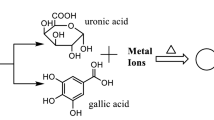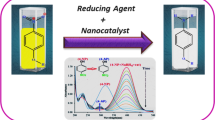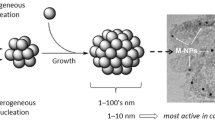Abstract
The selective oxidation of vanillin to vanillic acid was achieved using gold nanoparticles supported on alumina and titania. Selectivities up to 99 % at conversions over 90 % were obtained with pressurized oxygen as green oxidant in alkaline aqueous media. Our studies showed that the addition of at least 2 equivalents of strong Brönsted base had a crucial role in suppressing vanillin degradation and achieving high selectivity and conversion. The highest activities involved turn-over frequency values up to 1300 h−1 and were achieved using alumina supported catalysts.



Similar content being viewed by others
References
Chatterjee C, Pong F, Sen A (2015) Chemical conversion pathways for carbohydrates. Green Chem 17:40–71
Zakzeski J, Bruijnincx PCA, Jongerius AL, Weckhuysen BM (2010) The catalytic valorization of lignin for the production of renewable chemicals. Chem Rev 110:3552–3599
Fache M, Boutevin B, Caillol S (2016) Vanillin production from lignin and Its use as a renewable chemical. ACS Sustain Chem Eng 4:35–46
Hocking MB (1997) Vanillin: synthetic flavoring from spent sulfite liquor. J Chem Educ 74:1055
Sachdev D, Dubey A, Mishra BG, Kannan S (2008) Environmentally benign liquid phase oxidation of vanillin over copper containing ternary hydrotalcites. Catal Commun 9:391–394
Fache M, Darroman E, Besse V, Auvergne R, Caillol S, Boutevin B (2014) Vanillin, a promising biobased building-block for monomer synthesis. Green Chem 16:1987–1998
Gitzinger M, Kemmer C, Fluri DA, Daoud El-Baba M, Weber W, Fussenegger M (2011) The food additive vanillic acid controls transgene expression in mammalian cells and mice. Nucl Acids Res 40(5):e37. doi:10.1093/nar/gkr1251
Fargues C, Mathias Á, Silva J, Rodrigues A (1996) Kinetics of vanillin oxidation. Chem Eng Technol 19:127–136
Lindgren BO, Nilsson T (1973) Preparation of carboxylic acids from aldehydes (including hydroxylated benzaldehydes) by oxidation with chlorite. Acta Chem Scand 27:888–890
Jose T, Nandibewoor S, Tuwar S (2006) Kinetics and mechanism of the oxidation of vanillin by hexacyanoferrate(III) in aqueous alkaline medium. J Solut Chem 35:51–62
Hiremath DC, Kiran TS, Nandibewoor ST (2007) Oxidation of vanillin by diperiodatocuprate(III) in aqueous alkaline medium: a kinetic and mechanistic study by stopped flow technique. Int J Chem Kinet 39:236–244
Davis SE, Ide MS, Davis RJ (2013) Selective oxidation of alcohols and aldehydes over supported metal nanoparticles. Green Chem 15:17–45
Freakley S, He Q, Kiely C, Hutchings G (2015) Gold catalysis: a reflection on where we are now. Catal Lett 145:71–79
Della Pina C, Falletta E, Rossi M (2012) Update on selective oxidation using gold. Chem Soc Rev 41:350–369
Rautiainen S, Simakova O, Guo H, Leino A-R, Kordás K, Murzin D, Leskelä M, Repo T (2014) Solvent controlled catalysis: synthesis of aldehyde, acid or ester by selective oxidation of benzyl alcohol with gold nanoparticles on alumina. Appl Catal A 485:202–206
Liu H, Liu Y, Li Y, Tang Z, Jiang H (2010) Metal–organic framework supported gold nanoparticles as a highly active heterogeneous catalyst for aerobic oxidation of alcohols. J Phys Chem C 114:13362–13369
Enache DI, Edwards JK, Landon P, Solsona-Espriu B, Carley AF, Herzing AA, Watanabe M, Kiely CJ, Knight DW, Hutchings GJ (2006) Solvent-free oxidation of primary alcohols to aldehydes using Au–Pd/TiO2 catalysts. Science 311:362–365
Rautiainen S, Lehtinen P, Chen J, Vehkamäki M, Niemelä K, Leskelä M, Repo T (2015) Selective oxidation of uronic acids into aldaric acids over gold catalyst. RSC Adv 5:19502–19507
Zanella R, Giorgio S, Henry CR, Louis C (2002) Alternative methods for the preparation of gold nanoparticles supported on TiO2. J Phys Chem B 106:7634–7642
Xu A, Chai Y, Nohmi T, Hei TK (2009) Genotoxic responses to titanium dioxide nanoparticles and fullerene in gpt delta transgenic MEF cells. Part Fibre Toxicol 6:1–13
Delidovich IV, Moroz BL, Taran OP, Gromov NV, Pyrjaev PA, Prosvirin IP, Bukhtiyarov VI, Parmon VN (2013) Aerobic selective oxidation of glucose to gluconate catalyzed by Au/Al2O3 and Au/C: impact of the mass-transfer processes on the overall kinetics. Chem Eng J 223:921–931
Fargues C, Mathias Á, Rodrigues A (1996) Kinetics of vanillin production from kraft lignin oxidation. Ind Eng Chem Res 35:28–36
Zope BN, Hibbitts DD, Neurock M, Davis RJ (2010) Reactivity of the gold/water interface during selective oxidation catalysis. Science 330:74–78
Tsunoyama H, Sakurai H, Negishi Y, Tsukuda T (2005) Size-specific catalytic activity of polymer-stabilized gold nanoclusters for aerobic alcohol oxidation in water. J Am Chem Soc 127:9374–9375
Tsunoyama H, Tsukuda T, Sakurai H (2007) Synthetic application of PVP-stabilized Au nanocluster catalyst to aerobic oxidation of alcohols in aqueous solution under ambient conditions. Chem Lett 36:212–213
Acknowledgments
This work was funded by University of Helsinki Doctoral Programme in Chemistry and Molecular Sciences (CHEMS). The authors would like to thank Electron Microscopy Unit of the Institute of Biotechnology in University of Helsinki for providing laboratory facilities.
Author information
Authors and Affiliations
Corresponding author
Electronic supplementary material
Below is the link to the electronic supplementary material.
Rights and permissions
About this article
Cite this article
Rautiainen, S., Chen, J., Vehkamäki, M. et al. Oxidation of Vanillin with Supported Gold Nanoparticles. Top Catal 59, 1138–1142 (2016). https://doi.org/10.1007/s11244-016-0633-8
Published:
Issue Date:
DOI: https://doi.org/10.1007/s11244-016-0633-8




